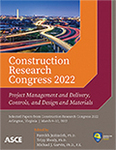A Framework for Estimating the Reuse Value of In Situ Building Materials
Publication: Construction Research Congress 2022
ABSTRACT
Rapid global population growth is leading to an increase in demand for raw materials. The construction sector is responsible for a major part of global material consumption, accounting for approximately 50% of raw material extraction. Although the demand for construction materials is increasing, natural resources are becoming scarcer. One solution to mitigate the pressure on natural resources is to implement urban mining strategies. These will require demolition, disassembly, and deconstruction processes that belong to the broader construction domain as it evolves toward a circular economy in the built environment. Significant work has been conducted on measuring and managing the availability of secondary materials in material banks. However, there is a lack of understanding of the market value of these material banks and their potential for decreasing raw material consumption. In this research, a framework that can be used to estimate the reuse and recycling market value of in situ materials is developed. The results of this research aim to positively impact the transition to a more circular economy in the built environment by bringing insight into the value of materials that are currently in-use but have the potential to support future demands.
Get full access to this article
View all available purchase options and get full access to this chapter.
REFERENCES
Aguiar, A., Vonk, R., and Kamp, F. (2019). BIM and Circular Design. IOP Conference Series: Earth and Environmental Science, 225(1). https://doi.org/10.1088/1755-1315/225/1/012068.
Akanbi, L., Oyedele, L., Davila Delgado, J. M., Bilal, M., Akinade, O., Ajayi, A., and Mohammed-Yakub, N. (2019). Reusability analytics tool for end-of-life assessment of building materials in a circular economy. World Journal of Science, Technology and Sustainable Development, 16(1), 40–55. https://doi.org/10.1108/wjstsd-05-2018-0041.
Basta, A., Serror, M. H., and Marzouk, M. (2020). A BIM-based framework for quantitative assessment of steel structure deconstructability. Automation in Construction, 111(October 2019), 103064. https://doi.org/10.1016/j.autcon.2019.103064.
Benachio, G. L. F., Freitas, M. D. C. D., and Tavares, S. F. (2020). Circular economy in the construction industry: A systematic literature review. Journal of Cleaner Production, 260, 121046. https://doi.org/10.1016/j.jclepro.2020.121046.
Brunner, P. H. (2011). Urban mining a contribution to reindustrializing the city. Journal of Industrial Ecology, 15(3), 339–341. https://doi.org/10.1111/j.1530-9290.2011.00345.x.
Ellen MacArthur Foundation. (2020). What is the Circular Economy. https://www.ellenmacarthurfoundation.org/circular-economy/what-is-the-circular-economy.
Ghisellini, P., Ripa, M., and Ulgiati, S. (2018). Exploring environmental and economic costs and benefits of a circular economy approach to the construction and demolition sector. A literature review. Journal of Cleaner Production, 178, 618–643. https://doi.org/10.1016/j.jclepro.2017.11.207.
Heinrich, M., and Lang, W. (2019). Materials Passports - Best Practice.
Honic, M., Kovacic, I., and Rechberger, H. (2019). Improving the recycling potential of buildings through Material Passports (MP): An Austrian case study. Journal of Cleaner Production, 217, 787–797. https://doi.org/10.1016/j.jclepro.2019.01.212.
Hoornweg, D., Bhada-Tata, P., and Kennedy, C. (2015). Peak Waste: When Is It Likely to Occur? Journal of Industrial Ecology, 19(1), 117–128. https://doi.org/10.1111/jiec.12165.
Kabirifar, K., Mojtahedi, M., Wang, C., and Tam, V. W. Y. (2020). Construction and demolition waste management contributing factors coupled with reduce, reuse, and recycle strategies for effective waste management: A review. Journal of Cleaner Production, 263, 121265. https://doi.org/10.1016/j.jclepro.2020.121265.
Linder, M., and Williander, M. (2017). Circular Business Model Innovation: Inherent Uncertainties. Business Strategy and the Environment, 26(2), 182–196. https://doi.org/10.1002/bse.1906.
Mondal, M. K., Bose, B. P., and Bansal, P. (2019). Recycling waste thermoplastic for energy efficient construction materials: An experimental investigation. Journal of Environmental Management, 240(May 2018), 119–125. https://doi.org/10.1016/j.jenvman.2019.03.016.
Pun, S. K., Liu, C., and Langston, C. (2006). Case study of demolition costs of residential buildings. Construction Management and Economics, 24(9), 967–976. https://doi.org/10.1080/01446190500512024.
Rios, F. C., Chong, W. K., and Grau, D. (2015). Design for Disassembly and Deconstruction - Challenges and Opportunities. Procedia Engineering, 118, 1296–1304. https://doi.org/10.1016/j.proeng.2015.08.485.
RSMeans. (2020). Site Work & Landscape Costs (39th ed.). Gordian.
Shindell, D. T. (2015). The social cost of atmospheric release. Climatic Change, 130(2), 313–326. https://doi.org/10.1007/s10584-015-1343-0.
The World Bank. (2021). What is Carbon Pricing? https://carbonpricingdashboard.worldbank.org/what-carbon-pricing.
World steel Association. (2011). Life Cycle assessment methodology report. In Worldsteel Association. www.worldsteel.org.
Yeung, J., Walbridge, S., and Haas, C. (2015). The role of geometric characterization in supporting structural steel reuse decisions. Resources, Conservation and Recycling, 104, 120–130. https://doi.org/10.1016/j.resconrec.2015.08.017.
Yeung, J., Walbridge, S., Haas, C., and Saari, R. (2017). Understanding the total life cycle cost implications of reusing structural steel. Environment Systems and Decisions, 37(1), 101–120. https://doi.org/10.1007/s10669-016-9621-6.
Information & Authors
Information
Published In
History
Published online: Mar 7, 2022
Authors
Metrics & Citations
Metrics
Citations
Download citation
If you have the appropriate software installed, you can download article citation data to the citation manager of your choice. Simply select your manager software from the list below and click Download.
